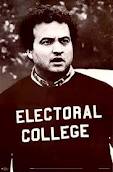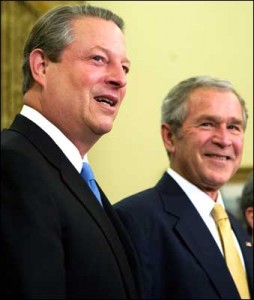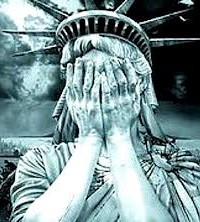- Two Thanksgiving Thoughts for the ACAPosted 10 years ago
- Shop til you Drop at the Healthcare Marketplace Part 2: Frustration!Posted 10 years ago
- An Early Casualty in the Affordable Care FightPosted 10 years ago
- Some Good News for a ChangePosted 10 years ago
Beware the Electoral College
As we are revving up to the Presidential Election in November, I feel it is my civic duty to point out that the Electoral College is lying in wait for us come year’s end. The College, unlike Franklin and Marshall and William and Mary, has nothing to do with education. It is the creation of the Founding Fathers, designed to put the outcome of national elections for President and Vice President in the hands of right-minded people. This, of course, occurred at a time when the only right-minded people allowed to vote were white male property-owners.
The Founders’s idea was that states would appoint electors, who in the infinite wisdom, would sort out who deserved to lead the country. Yes they could be guided by the outcome of the popular vote, but not bound by it. Washington, our first president, disliked political parties and wanted elections to be a high-minded under-taking, free of political parties. He failed almost immediately.
Soon the Founding Fathers discovered their system allowed Electors to choose as Vice President the losing Presidential candidate from the other party. John Adams was apoplectic when he discovered his opponent Thomas Jefferson was to be his Vice President. So much for the infinite wisdom of the Founding Fathers, including Adams and Jefferson. They had not had the benefit of watching American Idol while drafting the Constitution.
Later the system confounded the outcome of the Election of 1824. It was thrown into the House of Representatives where Speaker Henry Clay manipulated a deal that caused Andrew Jackson, the winner of the popular vote, to lose to John Quincy Adams. Clay became his Adams’s Secretary of State. Jackson smelled a rat.
As the country grew, many of these kinks got ironed out, but the Electoral College, which meets once each election year, hung on. In modern times, electors usually cast their votes for the winner of the popular vote in their state. Every once in a while however, an elector shows an independent mind, and casts his vote for someone else.
The number of electors is decided roughly by the population count of each state in the last national census. It roughly approximates the number of senators and congressmen from each state. The District of Columbia additionally has electors. All are paid for their (modest) services. They are wined and dined.
The worst outcome comes when the Electoral College selects someone other than the candidate who won the popular vote. This has happened three times since the Civil War. The most recent time was in 2000, when Albert Gore won the popular vote but lost to George W Bush in the Electoral College. That came after a challenge to the Florida outcome that ended up in the Supreme Court. In addition an elector of Gore’s pledged to vote for him declined to do so as a protest against the District of Columbia’s lack of representation in Congress. Gore’s decision not to seek further legal action to secure the office probably spared the country an ugly protracted fight.
Most responsible observers agree the Electoral College is horribly antiquated, redundant and needs to go. Unfortunately it would take a Constitutional Amendment to bring this about. No action has been taken in recent years to accomplish this. I vote to put the College out with the weekly trash.
In the three disputed outcomes since 1876, Republicans have been the benefactors when there is a disparity between the electoral vote and the popular vote. Does this explain the lack of activity? Given the polarized nature of the country, a perverse outcome in 2012 would likely not sit as easily as it did in 2000. A nasty dragged-out fight about the outcome would paralyze the nation in a way that is not pleasant to imagine
It is time for President Obama to charter a movement to update our election processes and eliminate the Electoral College. It is too late to affect this year’s process, but it is a reform this country desperately needs.
Tom Godfrey
.







The National Popular Vote bill would guarantee the Presidency to the candidate who receives the most popular votes in all 50 states (and DC).
Every vote, everywhere, would be politically relevant and equal in presidential elections. No more distorting and divisive red and blue state maps. There would no longer be a handful of ‘battleground’ states where voters and policies are more important than those of the voters in more than 3/4ths of the states that now are just ‘spectators’ and ignored.
When the bill is enacted by states possessing a majority of the electoral votes– enough electoral votes to elect a President (270 of 538), all the electoral votes from the enacting states would be awarded to the presidential candidate who receives the most popular votes in all 50 states and DC.
The bill uses the power given to each state by the Founding Fathers in the Constitution to change how they award their electoral votes for President. Historically, virtually all of the major changes in the method of electing the President, including ending the requirement that only men who owned substantial property could vote and 48 current state-by-state winner-take-all laws, have come about by state legislative action.
In Gallup polls since 1944, only about 20% of the public has supported the current system of awarding all of a state’s electoral votes to the presidential candidate who receives the most votes in each separate state (with about 70% opposed and about 10% undecided). Support for a national popular vote is strong among Republicans, Democrats, and Independent voters, as well as every demographic group in virtually every state surveyed in recent polls in closely divided Battleground states: CO – 68%, FL – 78%, IA 75%, MI – 73%, MO – 70%, NH – 69%, NV – 72%, NM– 76%, NC – 74%, OH – 70%, PA – 78%, VA – 74%, and WI – 71%; in Small states (3 to 5 electoral votes): AK – 70%, DC – 76%, DE – 75%, ID – 77%, ME – 77%, MT – 72%, NE 74%, NH – 69%, NV – 72%, NM – 76%, OK – 81%, RI – 74%, SD – 71%, UT – 70%, VT – 75%, WV – 81%, and WY – 69%; in Southern and Border states: AR – 80%,, KY- 80%, MS – 77%, MO – 70%, NC – 74%, OK – 81%, SC – 71%, TN – 83%, VA – 74%, and WV – 81%; and in other states polled: CA – 70%, CT – 74%, MA – 73%, MN – 75%, NY – 79%, OR – 76%, and WA – 77%. Americans believe that the candidate who receives the most votes should win.
The bill has passed 31 state legislative chambers in 21 small, medium-small, medium, and large states. The bill has been enacted by 9 jurisdictions possessing 132 electoral votes – 49% of the 270 necessary to bring the law into effect.
NationalPopularVote
Follow National Popular Vote on Facebook via nationalpopularvoteinc
This is an admirable undertaking. It will certainly get us closer to what is needed, though it still keeps the Electoral College in place. That would be a half-a-loaf solution, no doubt the better half. Again I ask if all the people at that site are in support of reform, why can’t we pass an amendment nationally to get rid of the college once and for all. Who exactly is still against this? We have in modern times changed the constitution about the Vice President.
Thanks for writing.
Tom
I did as promised do a follow up piece. It is at http://pennsquarepost.com/wordpress/?p=675. I wish you great success with this. TG
To abolish the Electoral College would need a constitutional amendment, and could be stopped by states with as little as 3% of the U.S. population.
Historically, virtually all of the major changes in the method of electing the President, including ending the requirement that only men who owned substantial property could vote and 48 current state-by-state winner-take-all laws, have come about by state legislative action, without federal constitutional amendments.
The presidential election system we have today is not in the Constitution, and enacting National Popular Vote would not need an amendment. State-by-state winner-take-all laws to award Electoral College votes, were eventually enacted by states, using their exclusive power to do so, AFTER the Founding Fathers wrote the Constitution. Now our current system can be changed by state laws again.
Unable to agree on any particular method for selecting presidential electors, the Founding Fathers left the choice of method exclusively to the states in section 1 of Article II of the U.S. Constitution– “Each State shall appoint, in such Manner as the Legislature thereof may direct, a Number of Electors . . .” The U.S. Supreme Court has repeatedly characterized the authority of the state legislatures over the manner of awarding their electoral votes as “plenary” and “exclusive.”
The constitution does not prohibit any of the methods that were debated and rejected. Indeed, a majority of the states appointed their presidential electors using two of the rejected methods in the nation’s first presidential election in 1789 (i.e., appointment by the legislature and by the governor and his cabinet). Presidential electors were appointed by state legislatures for almost a century.
Neither of the two most important features of the current system of electing the President (namely, universal suffrage, and the 48 state-by-state winner-take-all method) are in the U.S. Constitution. Neither was the choice of the Founders when they went back to their states to organize the nation’s first presidential election.
In 1789, in the nation’s first election, the people had no vote for President in most states, only men who owned a substantial amount of property could vote, and only three states used the state-by-state winner-take-all method to award electoral votes.
The current 48 state-by-state winner-take-all method (i.e., awarding all of a state’s electoral votes to the candidate who receives the most popular votes in a particular state) is not entitled to any special deference based on history or the historical meaning of the words in the U.S. Constitution. It is not mentioned in the U.S. Constitution, the debates of the Constitutional Convention, or the Federalist Papers. The actions taken by the Founding Fathers make it clear that they never gave their imprimatur to the winner-take-all method.
The constitutional wording does not encourage, discourage, require, or prohibit the use of any particular method for awarding the state’s electoral votes.
As a result of changes in state laws enacted since 1789, the people have the right to vote for presidential electors in 100% of the states, there are no property requirements for voting in any state, and the state-by-state winner-take-all method is used by 48 of the 50 states. States can, and frequently have, changed their method of awarding electoral votes over the years. Maine and Nebraska do not use the winner-take-all method– a reminder that an amendment to the U.S. Constitution is not required to change the way the President is elected.
The normal process of effecting change in the method of electing the President is specified in the U.S. Constitution, namely action by the state legislatures. This is how the current system was created, and this is the built-in method that the Constitution provides for making changes. The abnormal process is to go outside the Constitution, and amend it.
Your detailed response is very thought-provoking and gratefully appreciated. No doubt the adoption of the state by state National Popular Vote Bill would bring us much closer to an outcome that respects the national popular vote outcome.
But I don’t see that it eliminates it without ending the Electoral College. What of the Electors’ ability to vote as they want even after their selection. I understand that there are personal consequences in voting other than as expected but some have done it. In a close election, this might make a difference.
You did not address how the country was able to agree to the changes in the 25th amendment in the 1960’s, a time also of some polarization. And who exactly could reasonably argue against a constitutional amendment eliminating the role of the Electoral College? To do so is to suggest thwarting the will of voters. Obviously resistance to this change does exist. Where is it?
Tom
There have been 22,000 electoral votes cast since presidential elections became competitive (in 1796), and only 10 have been cast for someone other than the candidate nominated by the elector’s own political party. The electors now are dedicated party activists of the winning party who meet briefly in mid-December to cast their totally predictable rubberstamped votes in accordance with their pre-announced pledges. Faithless electors are not a practical problem, and most states have complete authority to remedy any problem there could be, by means of state law.
If a Democratic presidential candidate receives the most votes, the state’s dedicated Democratic party activists who have been chosen as its slate of electors become the Electoral College voting bloc. If a Republican presidential candidate receives the most votes, the state’s dedicated Republican party activists who have been chosen as its slate of electors become the Electoral College voting bloc. The winner of the presidential election is the candidate who collects 270 votes from Electoral College voters from among the winning party’s dedicated activists.
The U.S. Supreme Court has upheld state laws guaranteeing faithful voting by presidential electors (because the states have plenary power over presidential electors).
“who exactly could ‘reasonably’ argue against a constitutional amendment eliminating the role of the Electoral College?”
a random sampling of opponents’ reasons:
http://conservativesonfire.wordpress.com/2012/02/15/national-popular-vote-the-final-nail-in-the-coffin-of-the-republic/
http://juneauempire.com/opinion/2012-02-14/some-negative-effects-national-popular-vote-proposal
http://www.themoralliberal.com/2012/02/10/more-reasons-to-oppose-national-popular-vote/
http://nbcpolitics.msnbc.msn.com/_news/2011/12/07/9280257-mcconnell-warns-of-popular-vote-catastrophic-outcome
Ah ha! Finally the answer:
Phyllis Schlafly (I didn’t know she was still alive) an extreme Right Winger and ardent anti-feminist from the Goldwater era, Mitch McConnell (Mr.-I’ll-carry-the-water-for-the-Tea-Party so I have some clout), Ultra-Conservatives paranoid some city slicker is going to pull a fast one on them, and a blogger from Alaska worrying no Presidential candidate would come campaign there if there was a change. (How many visits are they getting now?)
Remember I put the word reasonably in there.
The articles you cite disclose some GOP support for reform. One person quoted does see a possibility the disconnect could work against the GOP the next time. It could.
This sounds depressingly like business as we know it in Washington now. Your links also disclose that these same reasonable forces are trying to thwart the National Popular Vote Movement at the state level.
How do you assess the movement’s chances against this array of rag-tag, fringy anti-populists? It sure would be nice if this effort was better known and more widely discussed. Tom
tom
The RNC and ALEC are also opponents.
NationalPopularVote.com
Follow National Popular Vote on Facebook via nationalpopularvoteinc
This is important and discloses who thinks this change is going to hurt them.
What about my second question about the current prospects of those leading this statewide movement. I would like to do a follow up piece about this. Tom